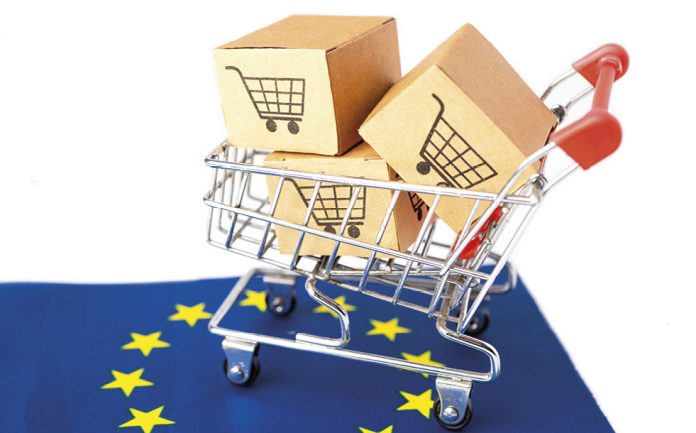By Mike Goodenough, Global Head of e-Retail at Worldline, Digital Commerce
Companies managing sales between the EU and UK have encountered significant complexity since the end of the transition period on December 31, 2020, as fees that were previously negated thanks to Britain’s status as an EU member country are now applied.
The additional costs this is creating for companies working in the UK – the world’s third most popular market for online cross-border shopping – are becoming a real headache for retailers on both sides of the Channel. While neither side would want to miss out on sales in normal circumstances, the advent of Covid and the impact that has had on both businesses and individuals has made it all the more important to continue selling to as many countries as possible.
Despite the fact that the UK’s referendum on leaving the EU was back in 2016, political rows resulted in a wait of more than four years before UK and EU merchants were given final details on all of the changes that Brexit would bring to supply chains, compliance and revenue. In the end, the announcement of a deal on Christmas Eve 2020 meant all affected parties had around a week to work out the best way to navigate the changes Brexit finally would bring.
VAT added to EU transactions
VAT was applied to sales between the UK and EU as soon as Britain had left the European Economic Area (EEA), resulting in higher costs for both buyers and sellers in the e-retail space. These fees applied from January 2021 and were at different levels depending on the type of goods being bought and sold, the cost of the goods and which direction they are travelling in. But as of July 2021, all goods imported to the EU will have VAT applied up to 20%, irrespective of the value of the products.
As you can imagine, this change had increased the complexity and administration of these transactions which has increased costs. In addition, online stores in the EU must now also file a tax return in the UK and need an EORI number to ship products to customers based in Britain. The potential for hold ups in Customs has increased too, as paperwork must be on point to prevent goods being rejected or held at the border, which could result in further duty charges and possibly fines. All of this has made it less cost-effective for UK customers to buy goods from European businesses.
Credit card fees set to rise from October 2021
As if all of this was not enough, customers and merchants are also facing higher charges on their credit card transactions from October because the UK is now not operating under the intra-European cap on interchange fees. Fees on cross-border transactions for both Mastercard and Visa will rise to 1.5% for credit card payments and 1.15% for debit card payments on cross-border transactions. Mastercard is only applying this to online purchases in the UK from the EEA, but Visa will apply these charges in both directions.
It is likely to only be a matter of time before these charges are passed onto consumers as has already happened in the US. The result for companies operating in this space could be higher chargebacks as consumers cancel orders and refuse to pay due to the unexpected extra charges.
How do you safeguard your e-retail business?
As the difficulties in continuing to operate in this space mount up, e-retailers could be forgiven for thinking there is nothing they can do to mitigate these additional costs. But there are a few things to consider:
1. Get a local store to cut your tax burden
If you have a local store in the UK as an EU merchant, you can remove these extra fees from your transactions, although this is unlikely to be feasible for smaller merchants. If this is not possible, you could appoint an EU-resident intermediary or VAT agent who can access the new EU Import One-Stop-Shop IOSS return for you which makes reporting VAT at the point of sale more straightforward.
2. Use payment methods that do not attract interchange fees
The likes of PayPal or buy-now-pay-later (BNPL) in the UK do not attract these fees and can help improve payment efficiency. In the Netherlands, for example, you could use iDeal bank transfers, or Cartes Bancaires cards in France.
3. Cut the number of disputes
Explaining what has happened to your business and charges as a result of Brexit should help to cut unnecessary chargeback claims. Doing this and providing tracking information, delivery updates and responding quickly to any purchase queries you may have will help to boost confidence in your company. You should also update your T&Cs on your site to set out exactly how these changes will impact customers, and to fully explain your refund process.
4. Plan how you are going to deal with compliance
Brexit has loomed large on the horizon for a long time and coping with these changes are likely to be a focus for the business. But remember there are other changes you must be aware of too as dropping the ball on these could cause real difficulties. For example, PSD2, has announced an extended deadline of 14 March 2022 for the implementation of Strong Customer Authentication (SCA) by merchants. It is sensible to keep abreast of any regulatory changes that could impact your business.
If you need help, ask for it
More customers than ever are shopping online as a result of the changes that COVID brought to our lives, so cross-border retailers need to get their offering right to ensure they get their piece of the pie. But it is not easy working out how to get the best from the current situation, so you may want to consider speaking to your payment services provider. They can help you with changes that have already manifested themselves and guide you through any future requirements that could affect your business. It is a good way to make sure your UK/EU business continues to go from strength-to-strength.
About the Author

Mike Goodenough has extensive experience working in payments and has held senior management roles throughout his career, currently for Worldline he is the Global Head of e-Retail, one of the key verticals within the organisation. Most recently as General Manager EMEA for Ingenico Mike lead all commercial activities within the region. Other roles have included managing the Global Partnerships and Alliances team responsible for optimizing global relationships such as large acquiring banks, card schemes and global alternative payment providers, leading product teams, sales teams and advising on M&A opportunities.
He has been deeply involved in Ingenico’s strategic growth initiatives and has accumulated more than 20 years of knowledge working in Global e-Commerce. Mike is a charismatic leader who enjoys working on complex projects and is well-known within the industry as a payments expert.




































